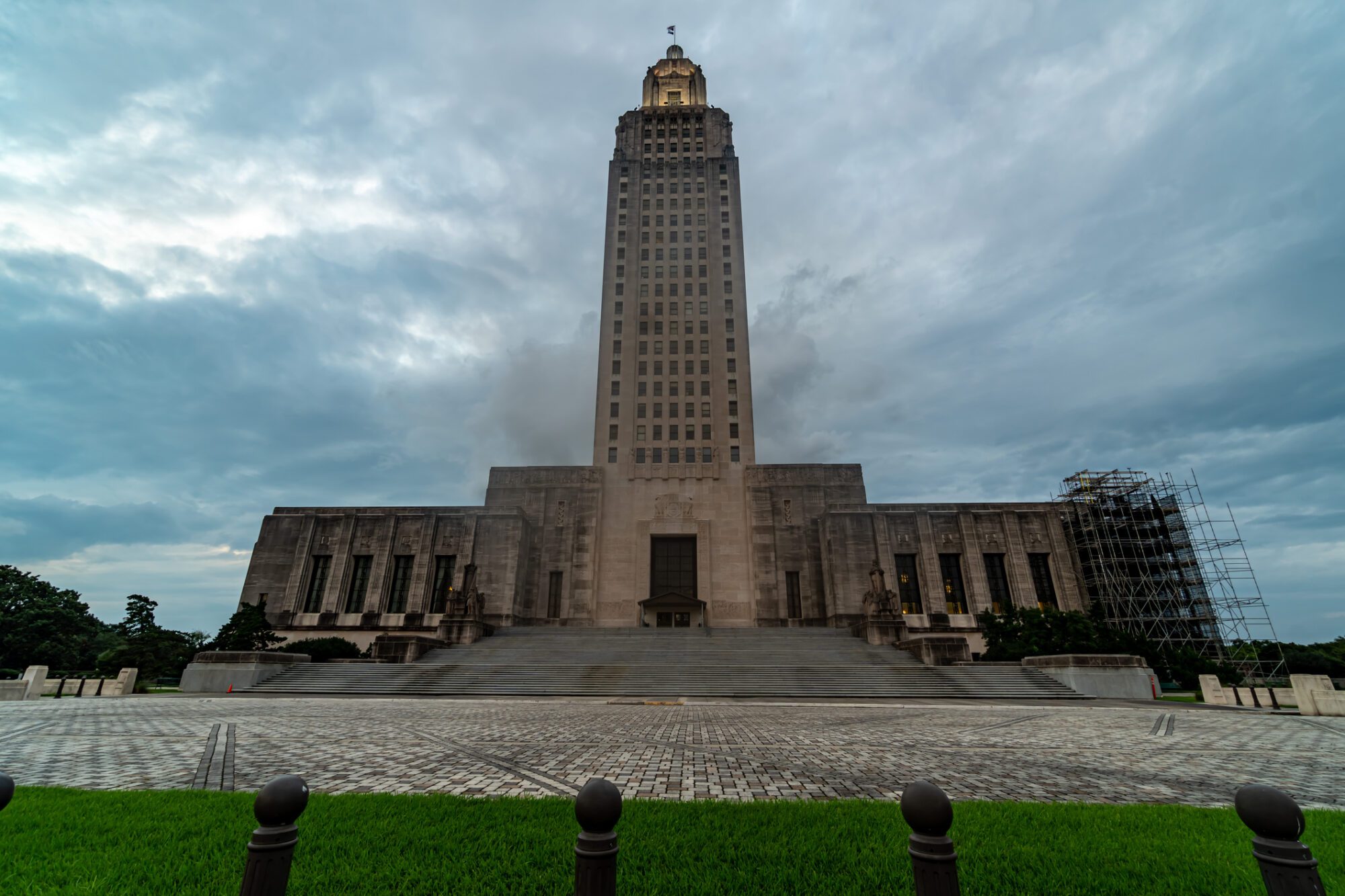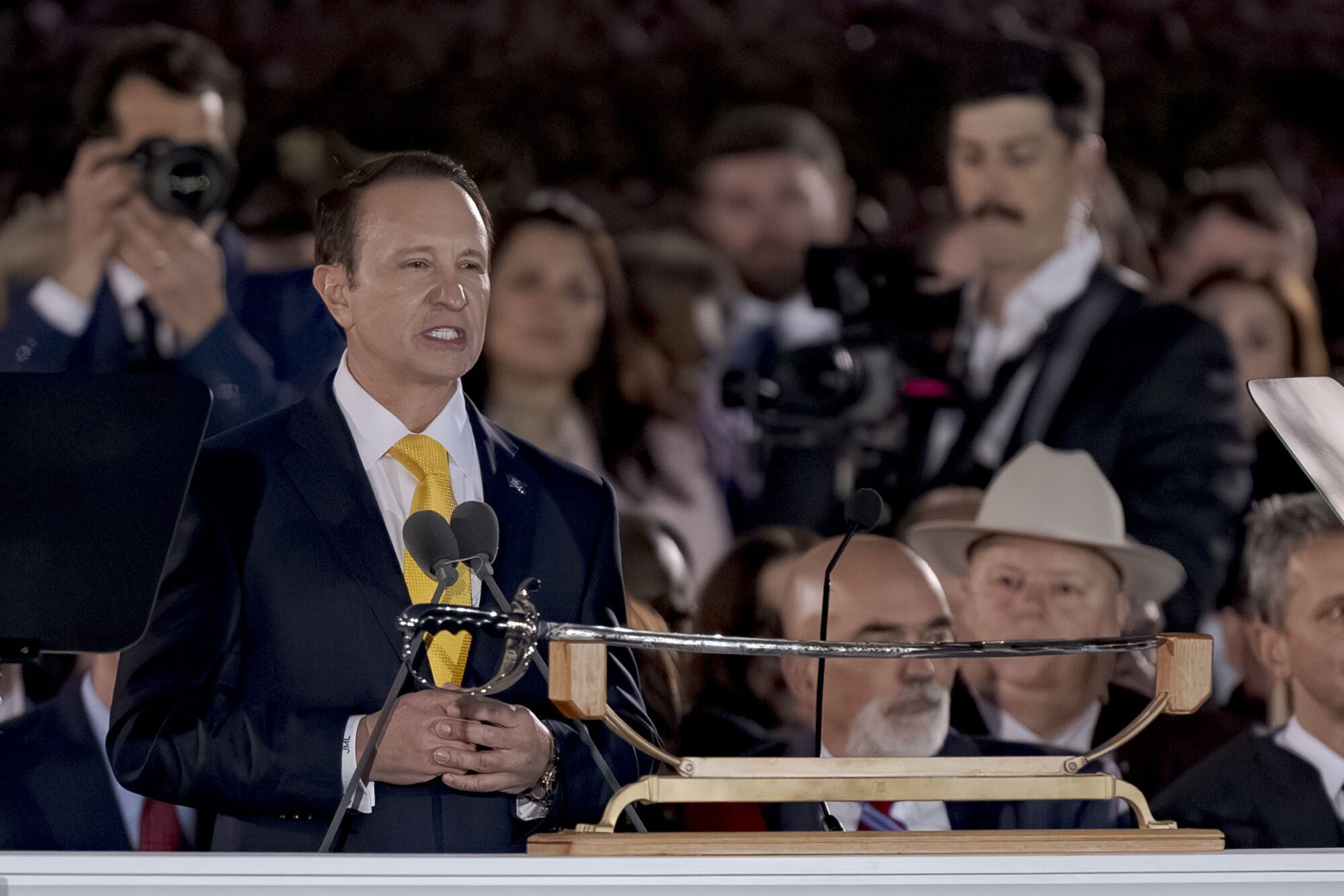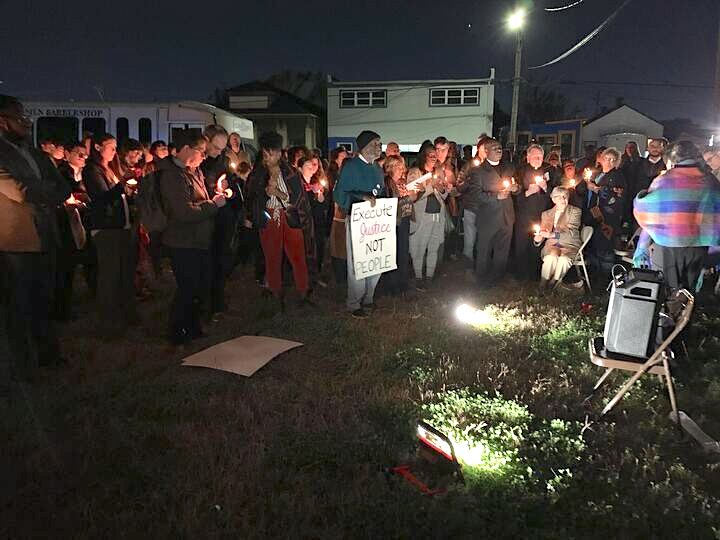Landry’s Power Play Over Public Defense in Louisiana
Changes to indigent defense could stretch an already-underfunded system and erode the quality of representation for poor people across the state.
| April 19, 2024
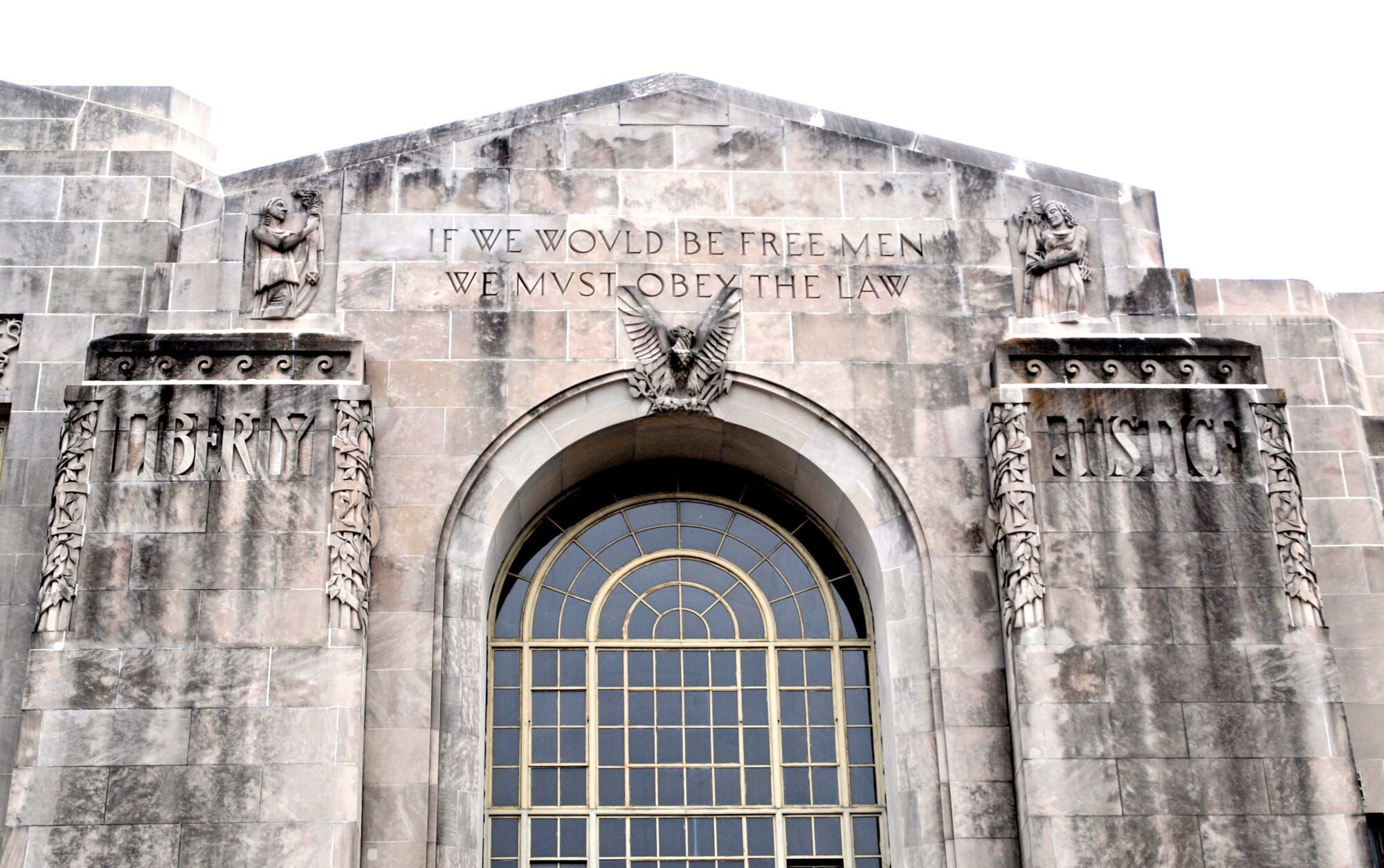
State Public Defender Rémy Starns holds a monthly virtual gathering with the lawyers in charge of Louisiana’s 42 public defender offices. “Coffee with Rémy,” as he calls these meetings, has become more tense in recent months as Starns rolls out pay cuts.
Louisiana passed legislation in March giving Governor Jeff Landry, a Republican who took office in January, more command over the state’s public defense system. Starns quickly told district defenders in charge of indigent defense across the state to start bracing for cuts to their pay—a reversal of raises the state had issued for defenders with basement-level salaries just a year ago.
During Starns’ first meeting with public defenders under the new law, which gives him more control over the state public defense budget, he warned of the cuts on the horizon—to the point of even encouraging district defenders to open private practices to supplement their income, as the Louisiana Illuminator first reported last month. The axe finally fell during Starns’ meeting with district defenders last week, when he announced salary cuts of up to 51 percent and a new scheme for paying district defenders.
In his meeting with district defenders, Starns insisted that he’s simply redistributing the state’s public defense budget “with goals of getting the most money, the most resources in the courtroom.” But public defenders and experts in indigent defense say Starns has provided few details on how he will accomplish that. Instead, his new plan stretches an already-underfunded system, and could jeopardize the quality of representation for the 146,000 people in Louisiana who need legal aid each year, they say.
Starns’ plan removes prohibitions on private practice for district defenders and boosts their pay if they take on their own cases in addition to managing their regional public defense offices. The plan also ties district defender pay to fees that clients must pay their office whenever they’re convicted, which critics say provides an incentive for offices to encourage quick convictions.
“When you have a system that incentivizes lawyers to lose, that’s a problem,” said Will Snowden, a Loyola University New Orleans law professor and former public defender. “How can any poor person reasonably believe that their public defender has their best interests at heart?”
Louisiana has long struggled with providing adequate representation for the roughly 85 percent of people accused of a crime who are too poor to afford a lawyer. Making the problem more dire, the state has the highest rate of incarceration in the U.S., and Black people are locked up at a much higher rate than white people. But public defenders, experts, and a member of the former board that oversaw legal aid told Bolts that problems across the system were consequences of a lack of reliable funding, not the people who oversaw it.
Landry, who in his first months as governor has pushed for and enacted dozens of bills that will increase traffic into Louisiana’s criminal legal system, also championed the law giving himself more say over indigent defense in the state. The legislation disbanded the previous 11-member board that decided the state public defense budget. In its place, it gave more control over that funding to Landry and created a new nine-member oversight board with less power over how the state spends its public defense dollars.
The legislation also cut money to programs that defend people against capital punishment; Landry, a death penalty supporter, has already signed legislation to resume executions in the state.
“This is the wild west now, and it’s never really been tame,” Jean Faria, Louisiana’s state public defender from 2008 to 2013, told Bolts of Landry’s newfound authority.
Landry and Starns did not respond to requests for comment or questions for this story.
During the debates over the bill, Landry insisted the changes were needed to improve indigent defense. “The Louisiana Public Defender system lacks accountability and has strayed from providing defense and moving criminal cases,” he said of the bill at the opening of the legislative session. “We propose to increase transparency and refocus the mission of providing defenders and support personnel for much needed efficiency.”
But experts in indigent defense told Bolts that the new law comes with few safeguards to protect against Landry or future governors abusing the public defense budget. They say the legislation removed a firewall of oversight that shielded the public defense system from the governor’s influence. One lawyer worried public defenders in charge of legal aid offices throughout the state will either quit or be forced to provide subpar representation because of salary reductions. Others say the legislation doesn’t fix existing problems with how Louisiana administers legal aid.
“I don’t see how there’s a way to look at this bill with honesty and in good faith and see that it will actually do anything to improve indigent defender services in the state,” Susan Meyers, a senior staff attorney with the Southern Poverty Law Center who worked on a 2017 lawsuit over Louisiana’s representation of poor people, told Bolts.
Just over a decade ago, Hurricane Katrina devastated Louisiana’s indigent defense system.
Louisiana is the only state in the country to primarily depend on money from court fees and traffic tickets to finance legal aid, including a $45 fee their clients have to pay if they’re convicted. When the money disappeared in the wake of Katrina, so did New Orleans’ public defenders. Prior to the storm, the office had 42 attorneys and six investigators. Afterwards, those numbers shrunk to six attorneys and a single investigator. Thousands of people jailed in the Orleans Parish Prison when the storm hit remained locked up for more than a year without talking to a defense lawyer.
As it became clear that the state didn’t have the infrastructure to ensure that people were guaranteed their constitutional right to a lawyer, the legislature in 2007 passed a law aimed at bolstering public defense. The bill, known as the Louisiana Public Defender Act, created a state fund to supplement money coming in from tickets and court fees. The bill also established an 11-member board to oversee public defenders and administer that new pot of money. This board, called the Louisiana Public Defender Board (LPDB), consisted of law professors, advocates, retired judges, and lawyers from across the state who were appointed by a variety of entities. It additionally created a scheme to make sure that people facing the death penalty received qualified lawyers with specialized training in handling those complicated cases.
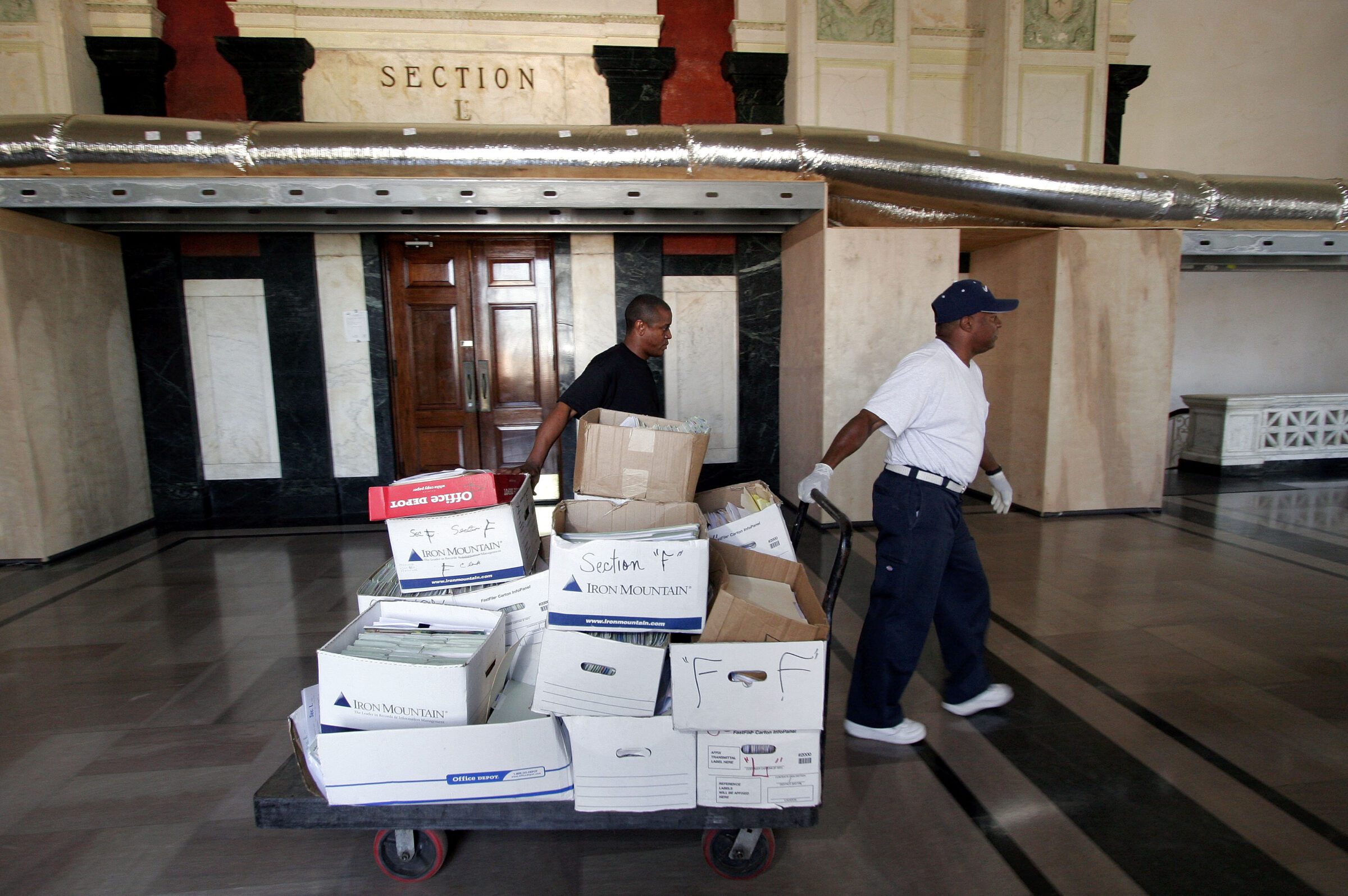
Experts lauded the changes. “They recognized they had a problem, they addressed it, they fixed it and that’s something I just think is great,” David Carroll, who at the time worked at the National Legal Aid and Defender Association, told NPR in 2007. (Caroll now leads the Sixth Amendment Center, a nonprofit working on improving indigent defense.)
When the original plan to assign lawyers to capital murder cases didn’t work out, the LPBD instead decided to contract with specialized nonprofits to perform death penalty work from trial to post-conviction appeals. “It made all the difference in the world,” said Faria, the former chief public defender, who later served on the LPBD coordinating capital defense.
Fewer people were unfairly sent to death row in a state where four out of five death sentences have been overturned, contributing to the highest reversal rate and number exonerations per capita in the country.
While the 2007 legislation created a blueprint for the successful administration of public defense, it failed to solve the funding problem. Law enforcement agencies continued to receive outsized funding compared to lawyers representing people who couldn’t afford a lawyer. In 2015, for example, New Orleans taxpayers paid $355 per capita to the New Orleans Police Department, $17 per capita to the district attorney, and $2.40 per capita for public defense, wrote former Chief Defender Derwyn Bunton in an op-ed.
By 2016, 33 of 42 public defender offices across the state were forced to restrict services at some level, with many offices placing people on months-long waitlists because funding deficits had made them unable to take on new clients.
“I think it’s fair to say everyone thinks there was problems. No one thinks the system was perfect by any stretch of the imagination,” Carroll told Bolts last month. “I’m a firm believer that it’s mostly rooted in the lack of funding and the over reliance on traffic tickets.”
A class action lawsuit filed by the Southern Poverty Law Center (SPLC) the following year alleged the “poor in Louisiana are denied access to effective and meaningful attorney representation when facing criminal charges.” The complaint, which has since been dismissed, included accounts showing how people facing charges received poor representation. One man had such minimal contact with his lawyer that the lawyer allowed a judge to issue a bench warrant to arrest him, even though he was still incarcerated. Another, who was facing up to 30 years in prison, was represented by a lawyer who worked as a prosecutor in another parish. He’d spoken to his lawyer for just five minutes over the course of more than six months.
Landry’s seizure of public defense happened during a nine-day special legislative session on crime, when the Republican-controlled legislature passed all 39 bills put before them—including laws to automatically place 17-year-olds in the adult system, limit post-conviction relief, and resume executions through new methods and increased secrecy.
Starns, the state public defender, and State Senator Mike Reese, the bill’s sponsor, were the only two people to testify in favor of the bill restructuring the state public defense system during a House committee hearing on it in February, while dozens of people testified in opposition. Critics raised concerns about giving Landry more control over public defense as he ratchets up punishment in the state, a move that will create the need for increased legal aid. “The statute as written risks creating further instability and backlogs in a criminal legal system that is about to face enormous and perhaps unprecedented changes,” testified Pamela Metzger, a Southern Methodist University law professor who represented prisoners who couldn’t afford an attorney in the wake of Hurricane Katrina.
The previous board also worked within the governor’s office but its power was spread among 11 people instead of a single governor’s appointee. Though the state public defender will now have the ultimate authority over legal aid, their appointment will be subject to approval by the senate and the new nine-member oversight board, which will be responsible for approving contracts over $250,000.
This new board met for the first time last month. The governor selects four of the board’s nine members, and he also gets to choose a fifth out of a list submitted by the Louisiana Association of Criminal Defense Lawyers and Public Defenders Association of Louisiana. The remaining members are named by the Louisiana Supreme Court and the leaders of the two legislative chambers.
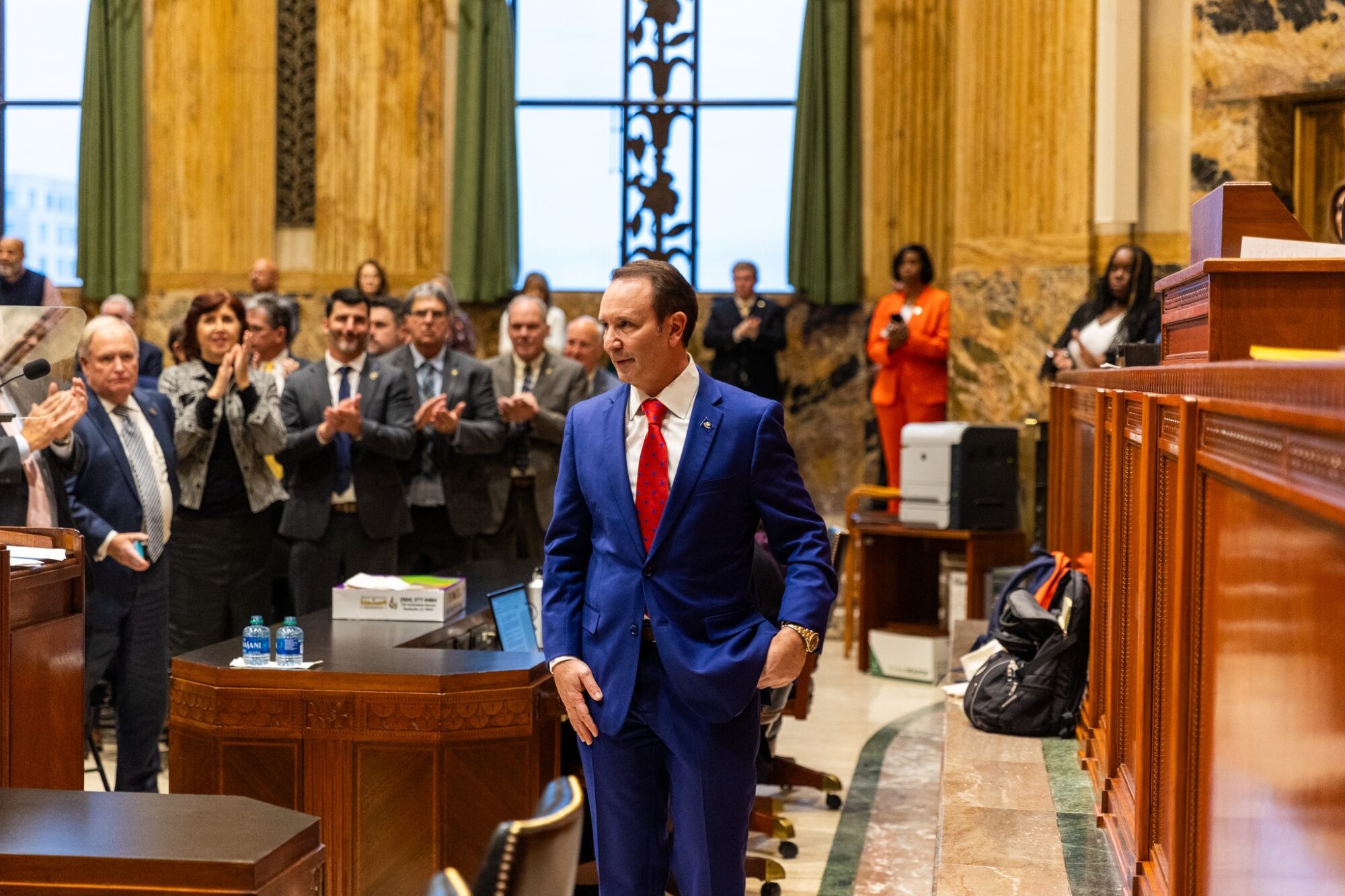
There’s no longer a requirement that the board reflect the racial and gender makeup of the state, spurring concerns about whether it’s built to provide the necessary oversight. No one on the board even appears to have a background in public defense.
“It’s just frustrating that we don’t have the kind of experiential knowledge represented on this board,” Snowden told Bolts. “I think that’s certainly going to have negative effects on what public defense looks like in the state.”
Malia Brink, a senior policy attorney at Southern Methodist University’s Deason Criminal Justice Reform Center, warned the House committee in February of the possibility that the governor could act through the chief public defender to devalue public defense. “If you have someone appointed by the governor, then the governor doesn’t have to say anything,” Brink said during her testimony to the committee. “If you know where the governor stands, you may be influenced or pressured to act accordingly.”
She continued, “No person, not even a governor, can be both prosecutor and defender.”
The dual powers will be especially relevant in death penalty cases, the majority of which are represented by public defenders. The governor is in charge of signing death warrants and deciding whether to spare someone’s life by granting a clemency petition. As attorney general, Landry sued to block clemency hearings for 55 death row prisoners who filed petitions in hopes they’d be spared by outgoing Governor John Bel Edwards, a Democrat, before he left office.
Under the new law, Landry’s appointee now has more control over a shrinking pot of funding for defending poor people who face execution; as part of the legislation, lawmakers also cut funding to programs representing capital defendants from 35 percent to 25 percent of the public defense office’s budget.
Tony Clayton, the DA of West Baton Rouge, Iberville, and Pointe Coupee parishes who led the Landry transition team that pushed for restructuring public defense, told nola.com in February that the goal of the legislation was to spend less on death penalty defense organizations. “The constitution says they’re entitled to a defense, but they sure as hell aren’t entitled to a Cadillac defense,” he said.
Louisiana hasn’t executed anyone since 2010 but lawmakers passed a bill last session that will make it easier to restart executions even in the face of lethal drug shortages. The legislation authorized nitrogen and electrocution as alternative execution methods to lethal injection and made it easier to secure drugs by shielding suppliers from public disclosure.
“We all believe that Landry is going to have a heavy hand in making sure people get executed,” said Nick Trenticosta, a Louisiana death penalty lawyer. He estimated that five people of the 62 people on death row have exhausted their appeals and are eligible for execution.
Starns could elect to cut all funding to the seven death penalty programs that get state funding for capital defense, or he could still fund those programs but mandate they move into district public defender offices and perform other work. Starns hasn’t yet announced his budget, but several sources told Bolts that he’s been meeting with the death penalty organizations to hammer out a new plan.
“If there is not a concerted effort to insulate and isolate each of those units from the budgetary and caseload issues associated with already overburdened public defenders, then you will see a significant uptick in death penalty prosecutions and convictions and sentences,” said Faria, the former state public defender. “You will see a continued retention problem in the offices themselves and an erosion in the Sixth Amendment right to counsel.”
Louisiana’s Public Defender Board first appointed Starns to be the state’s head public defender in 2020. Prior to taking over, he was a prosecutor in Avoyelles Parish and a founding member of the LPDB. He had no experience himself working in the trenches as a line public defender, although he had done some criminal defense work in private practice.
In private practice, Starns also defended the state against the 2017 SPLC lawsuit alleging that its representation of poor people was deficient. The lawsuit, he wrote in a filing, was filled with “loud howls regarding a lack of funding.”
Starns, whom Landry reappointed to the newly empowered role last month, has maintained that he wants to create a more stable system with better paid public defenders, but his critics say he’s not experienced enough in public defense to handle the job. Several people told Bolts that Starns does not believe in caseload standards, a tool the American Bar Association recommends to determine how many cases defense lawyers should handle at a time to ensure their clients receive effective representation.
The standards are also used by policymakers to decide funding by looking at how many lawyers are needed to handle an office’s caseload. Instead, Starns measures how much money each district receives by examining how many people it represents, a figure that public defense experts say doesn’t accurately reflect the workload of each office because some people may have several cases and those cases can vary in severity. “Now I have real concerns that he is going to just develop these fantastical imaginary guidelines to fund those officers at a bare bones level,” said Flozell Daniels, who served on the LPDB for nearly 11 years until 2023.
Though parishes still rely on traffic tickets and court fees to partially fund indigent defense, the legislature under Edwards had increased state funding for public defense in recent years. Last year, it allocated more than $50 million, nearly $20 million more than in 2015. Despite those increases, district defenders still have trouble attracting and retaining line defenders—who are not state employees and do not receive state benefits such as health insurance and retirement, although some district offices pay for line defenders to buy private insurance plans.
“Excessive workloads, depleted staff and attrition continue to be the biggest obstacles regarding our representation,” wrote Danny Engelberg, the Orleans Parish district defender, in the 2023 LPDB annual report.
The pay raises last year were a bid to improve these staff and retention issues, said Daniels, who sat on the board when it approved the raises. “I see no reason why we shouldn’t have competitive salaries to ensure that we can attract the best talent because that’s what’s going to really create some high functioning public defenders,” he said.
Daniels said Starns was clearly angered by their decision. During his virtual coffee hour with district defenders last month, Starns called the raises an “abomination” and an “irresponsible obscenity.”
And his decision to reverse the pay raises was one of his first moves in his newly empowered role. Prior to the raises, defenders made between $50,000 to $155,000 per year, according to the Louisiana Illuminator. After the raises, they made between $95,000 to $160,000. Their compensation was based on several factors, including a $20,000 bonus for defenders who solely worked in public defense and did not work in private practice.
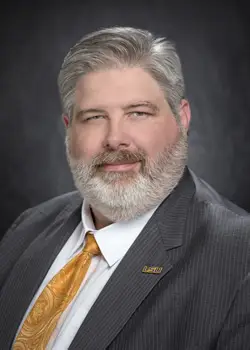
Under the new scheme, according to a slideshow detailing the plan obtained by Bolts, district defenders will make between $60,000 and $180,000.
The state hasn’t yet passed this year’s budget so it’s not clear how much Starns will have at his disposal, but he says his plan to change how district defenders are paid will result in better paid line defenders. Still, two district defenders told Bolts that even marginally better pay won’t make those jobs easier to fill. They said they regularly give their line defenders raises but still struggle to retain them because it’s difficult to compete with private law firms that can pay much more and offer a more comfortable schedule and benefits.
John Lindner, head defender of the 22nd Judicial District, which covers St. Tammany and Washington parishes, told Bolts he hadn’t asked for a raise in his 12 years on the job, largely because his office was facing financial issues. Last year’s raise, he calculated, amounted to a 2.5 percent increase for each year he’s worked. “In the grand scheme of things, you know, it wasn’t a big, big thing. It was something we should have gotten anyway.”
The new plan promises bigger bonuses for districts that collect more in conviction and user fees. A district defender overseeing a district that collects $1 million in those fees will get a $20,000 bonus, while a defender whose district collects less than $250,000 will receive nothing.
Defenders receive a 25 percent bonus for taking on their own caseload, a factor that some took issue with. “In a district my size that’s almost impossible,” said one district defender. “So I have no opportunity to get that additional [money] because I’m not able to take a caseload because I’m presently managing my district?”
Starns also announced that there will be no restrictions on district defenders working in private practice, dissolving the previous limitations on the extra work. The move contradicts ABA standards, which say that lawyers working at defense organizations should work full-time and not engage in private practice work.
Prior to Starns’ announcement about salary reductions, some worried that the cuts will force talented district defenders to quit.
“Is everybody going to quit at once? I don’t know,” a district defender who asked not to be named out of fear of retaliation told Bolts. “I mean, you know, my biggest fear is that people won’t quit. And they’ll keep it part time because of the insurance. And then like, things will just run into the ground.”
After the meeting, Lindner said he was focused on changes that will improve indigent defense for clients.
“What I want to see as an end game, is I want to see a public defender system that provides the best possible representation for poor people. And I want them properly trained, and I want them, you know, compensated fairly,” he said. “And I think it’s, you know, we still have a long way to go with that.”
Sign up and stay up-to-date
Support us
Bolts is a non-profit newsroom that relies on donations, and it takes resources to produce this work. If you appreciate our value, become a monthly donor or make a contribution.


